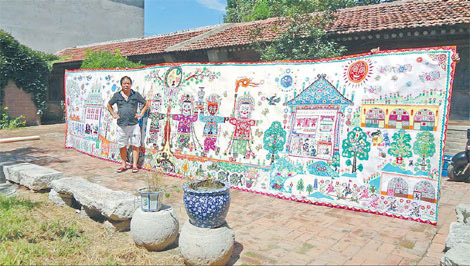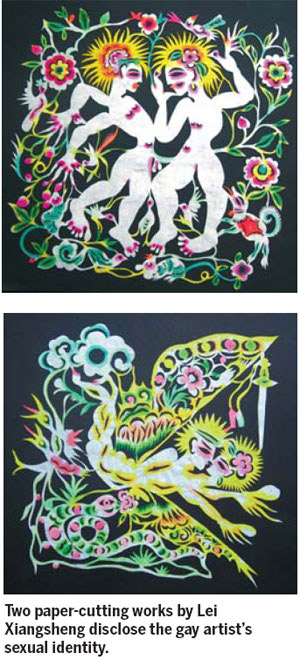 |
|
Lei Xiangsheng displays a 9-meter-long paper-cutting work by himself at his home in Songzhuang art village in Beijing. Photos provided to China Daily |

Lei Xiangsheng - aka, Siberian Butterfly - blazes new territory with his homoerotic paper-cutting. Cheng Anqi reports.
Paper-cutting has been a Chinese tradition since the Eastern Han Dynasty (AD 25-220) - but Lei Xiangsheng is perhaps the first modern man to give paper-cutting a homoerotic edge.
The gay married farmer from rural Shaanxi, who lives in Beijing, has given the art form - generally reserved for his hometown's older illiterate women to express their feelings - a gay twist that has been raising eyebrows in China and now in the United States.
The 48-year-old's provocative works are on display at the Flazh!Alley Art Studio in San Pedro, California, until July 14. The Metamorphosis of a Butterfly: A Kaleidoscope Vision of Life by a Gay Chinese Artist takes its name from the exhibition's creator's moniker, "Xiyadie", or "Siberian Butterfly", which Lei used when he feared being outed. He tells the Los Angeles Times: "(The name) expresses hope and my wish for freedom in a cold and harsh environment."
He explains to China Daily: "(Paper-cutting) is my stage where I can be free. I can dance with abandon and fly to the moon. I can give free rein to my thoughts and live out my fantasies. I can love and hate."
His experiences inform his work, he says. Lei spent much of his life repressing his homosexuality. He followed the path expected of men of his generation - getting married and having children.
"That's how it goes," Lei says.
"Life is full of contradictions. If I'd realized I'm gay, I wouldn't have married."
He has come out to his wife, who remains in Shaanxi, the Los Angeles Times reports. She cried and then accepted it, the newspaper says. But his children - his 22-year-old daughter and his 24-year-old son, who has cerebral palsy - don't know.
Lei's daughter recently called - she rarely speaks to him, he says - to say he should be kind to, but divorce, her mother, he says.
"Maybe she already knows. I don't think it's hard for her to understand," Lei says.
The father, who never went past middle school, sends most of the 1,200 yuan ($191) he earns from odd jobs - recycling, cooking and grounds-keeping at Beijing's Songzhuang art village - to his family, especially to put his daughter through college.
Lei depicts these feelings of double identity in one paper-cutting, which shows a man kissing his wife with one face and his boyfriend with another.
In another, two men watch a young plant grow to find their genitals are connected to it. One work shows a yellow butterfly with a nude human male's body.
An especially evocative piece shows two men with thick eyelashes pleasing each other in a bush.
"I'm a farmer, but I also want to make art," he says.
So, his works often pair rural themes with depictions of same-sex love.
His bedroom studio hosts hundreds of such paper-cuttings.
Lei learned the craft from his mother in his hometown, where old, illiterate women with bound feet would create the patterns to decorate their homes.
"The art form is so fascinating that I eventually fell in love with it," Lei says.
He studied the techniques used by his mother and her peers, but it wasn't until about a decade ago that he set scissors to paper.
Lei was then raising his disabled son. He recalls he had to chew the boy's food for him, when his wife was laboring as a migrant worker in cities.
At first, Lei cut traditional themes - auspicious symbols for weddings, longevity or births.
His works gradually came to take more inspiration from his personal life.
He created a piece that depicts his first gay encounter with a train attendant. Two naked men stand, hand-in-hand, as they gaze at a flying swan.
"The swan," he says, "symbolizes freedom."
|
|
|
|
|
|
|
|
